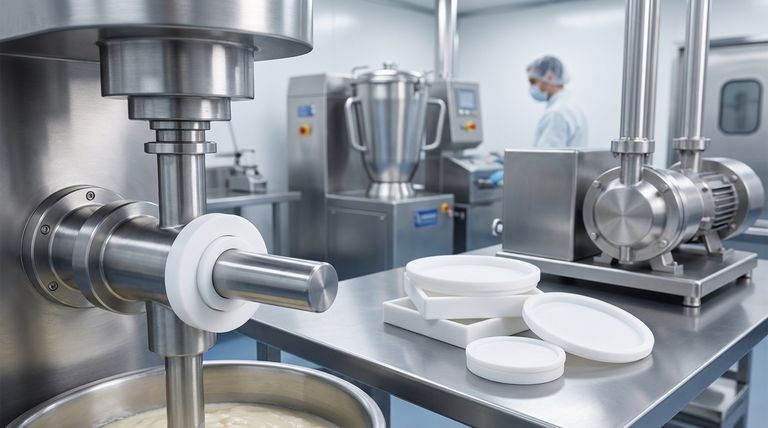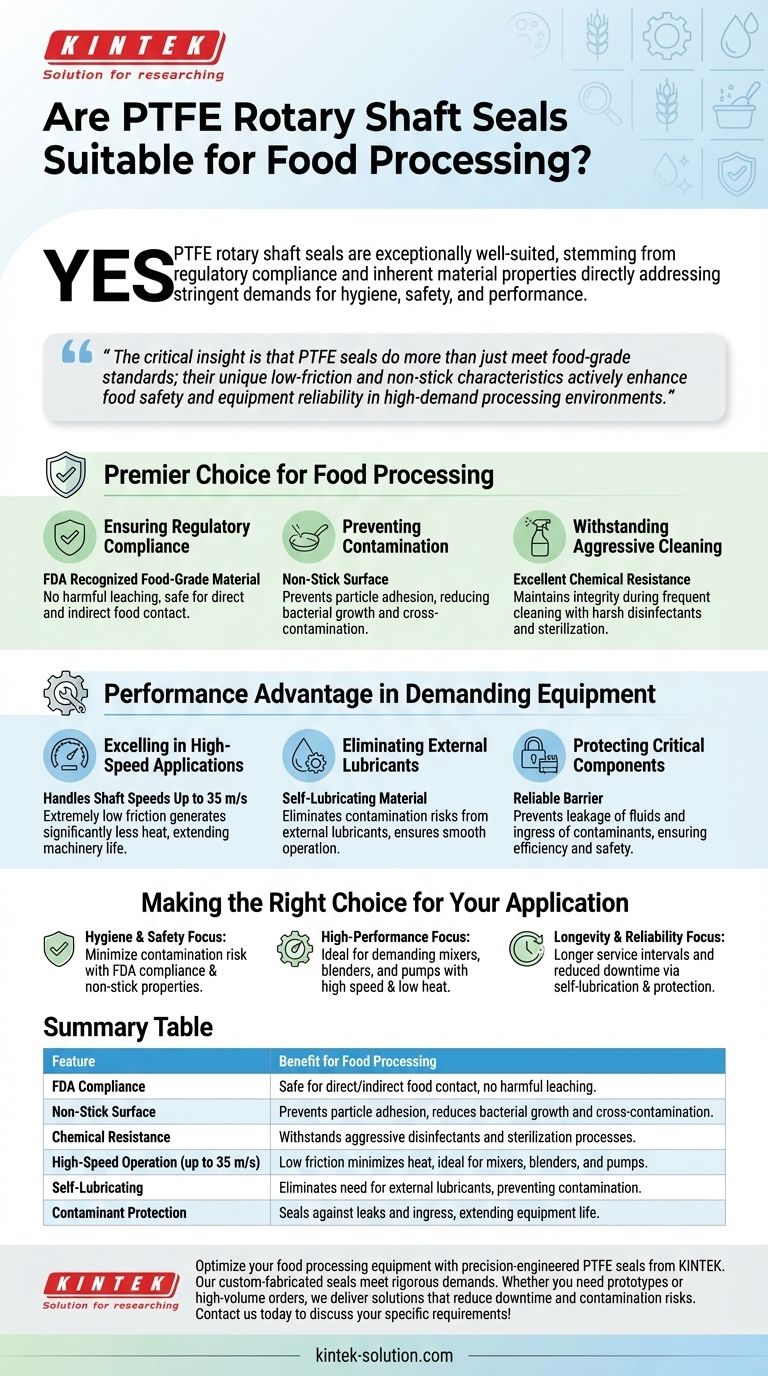Yes, PTFE rotary shaft seals are exceptionally well-suited for food processing applications. Their suitability stems from a combination of regulatory compliance and inherent material properties that directly address the industry's stringent demands for hygiene, safety, and performance. PTFE seals are not only compliant with FDA regulations but also feature a non-stick surface that simplifies cleaning and prevents contamination.
The critical insight is that PTFE seals do more than just meet food-grade standards; their unique low-friction and non-stick characteristics actively enhance food safety and equipment reliability in high-demand processing environments.

Why PTFE is a Premier Choice for Food Processing
The suitability of PTFE seals goes far beyond a simple compliance check. The material's fundamental properties make it an ideal solution for the unique challenges of the food and pharmaceutical industries.
Ensuring Regulatory Compliance
One of the most critical requirements in this sector is material safety. PTFE is recognized as a food-grade material and is compliant with FDA regulations.
This compliance ensures that the seal material itself will not leach harmful substances into the product, making it safe for direct and indirect food contact.
Preventing Contamination with a Non-Stick Surface
In food processing, the prevention of contamination is paramount. PTFE's non-stick properties are a significant advantage.
This characteristic prevents food particles and other media from adhering to the seal surface, which drastically reduces the risk of bacterial growth and cross-contamination between batches.
Withstanding Aggressive Cleaning and Sterilization
Food processing equipment must undergo frequent and aggressive cleaning. PTFE seals demonstrate excellent resistance to the disinfectants and sterilization processes common in the industry.
This ensures the seal maintains its integrity and performance life, even when exposed to harsh chemicals and high temperatures during cleaning cycles.
The Performance Advantage in Demanding Equipment
Beyond hygiene, PTFE seals offer distinct mechanical advantages that are crucial for the machinery used in food production, such as mixers, blenders, and pumps.
Excelling in High-Speed Applications
Many food processing operations involve high-speed rotating equipment. PTFE seals are engineered to handle shaft surface speeds up to 35 m/s.
Because of PTFE's extremely low coefficient of friction, these seals generate significantly less heat during operation. This reduces the risk of premature seal failure and extends the life of the machinery.
Eliminating the Need for External Lubricants
PTFE is a self-lubricating material, which is a crucial benefit in food applications where external lubricants could become a source of contamination.
This property ensures smooth operation and minimizes breakout torque without introducing non-food-grade substances into the processing environment.
Protecting Critical Machinery Components
The primary function of any seal is to prevent leaks and protect machinery. PTFE seals create a reliable barrier that prevents leakage of processing fluids and stops external contaminants from entering sensitive components.
This is essential for ensuring the efficiency, safety, and longevity of expensive processing equipment.
Making the Right Choice for Your Application
To determine if PTFE seals are the optimal choice, consider your primary operational goal.
- If your primary focus is hygiene and safety: PTFE's FDA compliance, non-stick surface, and resistance to cleaning agents make it a superior choice for minimizing contamination risk.
- If your primary focus is high-performance machinery: The ability to handle high speeds (up to 35 m/s) with low heat generation makes PTFE seals ideal for demanding mixers, blenders, and pumps.
- If your primary focus is equipment longevity and reliability: The self-lubricating nature and contaminant protection offered by PTFE seals contribute directly to longer service intervals and reduced downtime.
Ultimately, choosing PTFE rotary shaft seals is a decision that supports both product safety and operational excellence in food processing.
Summary Table:
| Feature | Benefit for Food Processing |
|---|---|
| FDA Compliance | Safe for direct/indirect food contact, no harmful leaching |
| Non-Stick Surface | Prevents particle adhesion, reduces bacterial growth and cross-contamination |
| Chemical Resistance | Withstands aggressive disinfectants and sterilization processes |
| High-Speed Operation (up to 35 m/s) | Low friction minimizes heat, ideal for mixers, blenders, and pumps |
| Self-Lubricating | Eliminates need for external lubricants, preventing contamination |
| Contaminant Protection | Seals against leaks and ingress, extending equipment life |
Optimize your food processing equipment with precision-engineered PTFE seals from KINTEK. Our custom-fabricated seals are designed to meet the rigorous demands of the semiconductor, medical, laboratory, and industrial sectors, ensuring FDA compliance, enhanced safety, and reliable performance in high-speed applications. Whether you need prototypes or high-volume orders, we deliver solutions that reduce downtime and contamination risks. Contact us today to discuss your specific requirements!
Visual Guide

Related Products
- Custom PTFE Parts Manufacturer for Teflon Containers and Components
- Custom PTFE Parts Manufacturer for Teflon Parts and PTFE Tweezers
- Custom PTFE Sealing Tapes for Industrial and High Tech Applications
- Custom PTFE Sleeves and Hollow Rods for Advanced Applications
- Customizable PTFE Rods for Advanced Industrial Applications
People Also Ask
- Are expanded PTFE gaskets as durable as standard PTFE gaskets? Discover the Best Choice for Your Seal.
- What is the purpose of sintering in the PTFE bush manufacturing process? | Achieve Superior Component Performance
- What are recommended tolerances for machining PTFE parts? Achieve Dimensional Stability & Cost-Effectiveness
- What are the core material options for PTFE encapsulated O-rings? Choose Viton® or Silicone for Your Sealing Needs
- What are the benefits of using Teflon bellow mechanical seals in high-temperature applications? Superior Sealing for Harsh Chemicals
- What are the benefits of Teflon's self-lubricating properties in mechanical applications? Boost Efficiency and Cut Costs
- How does chemical resistance benefit PTFE Teflon washers? Ensure Leak-Free Seals in Harsh Environments
- What are the five main advantages of PTFE O-rings? Superior Sealing for Harsh Environments



















